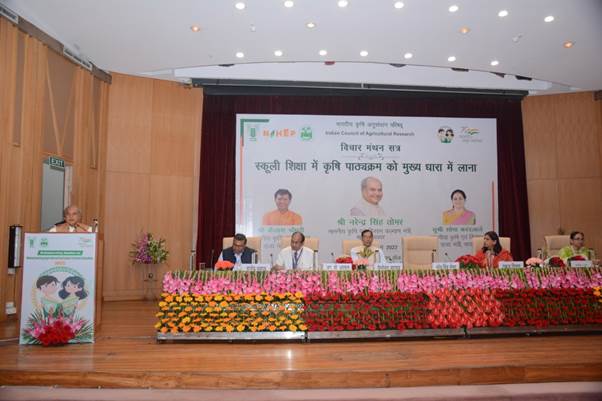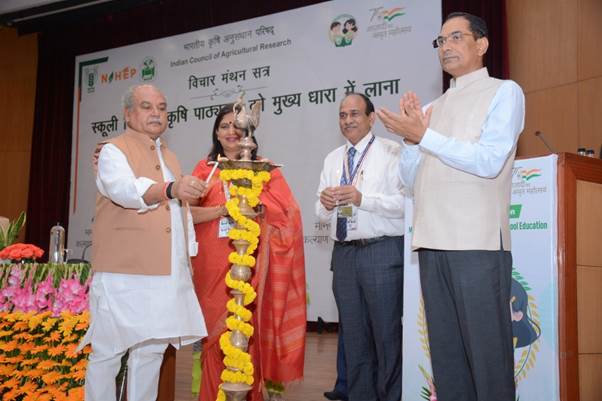
Indian Council of Agricultural Research (ICAR) organized a brainstorming session today to mainstream agriculture curriculum in school education. It was inaugurated by the Union Minister of Agriculture and Farmers Welfare, Shri Narendra Singh Tomar. Speaking on the occasion, Shri Tomar said that agriculture sector occupies a very important place in the country and the livelihood of large population is dependent on agriculture. Agriculture is India’s strength and its predominance will not only remain in the future but it will also expand. In view of this, ICAR has made an effort to integrate the agriculture world with the new education policy.
The objective of this event is to focus on designing agricultural education system towards developing vocational curriculum including agricultural science to provide better education under the National Education Policy (NEP), 2020. Therefore, a new paradigm will be introduced at the primary, middle and secondary school levels, with vocational courses at the higher level for the development of students and youth in agriculture and allied sciences. As a result, this brainstorming session will help develop and evolve a policy to include agriculture as a subject in the curriculum and provide students with an option to pursue a career in various fields of agriculture.

Shri Tomar said that the agriculture sector has supported the country like a backbone even in adverse circumstances. Recently, our agriculture sector has performed well despite the Covid crisis. There is a need for continuous improvement, increased investment and technology support in this area. Prime Minister Shri Narendra Modi also wants that farmers should move towards prosperity by adopting these measures and accordingly the government has taken many concrete steps. There are many dimensions in agriculture, on which it is necessary to work together, while the challenges have also been overcome at a fast pace. Towards this end, agricultural curriculum should also find a place in school education and it is necessary that there should be continuity in agriculture and every Indian should be connected with it. Shri Tomar said that if the interest towards agriculture sustains in the children from the school level, then they will be able to move towards agriculture after college. Our farmers are naturally skilled workers. In the present circumstances, the agriculture sector is going to create a lot of employment opportunities in the times to come. In this regard, he mentioned about linking agriculture with technology and setting up of the Agriculture Infrastructure Fund worth Rupees one lakh crore by the central government.

Dr. Trilochan Mohapatra, Secretary, DARE and Director General of ICAR was present in today’s brainstorming session. ICAR Deputy Director General (Agriculture Education) Dr. R.C. Agrawal gave a presentation on the current status of agricultural education in the country and the need to bring agricultural education at the school level. Principals of schools, senior teachers and other experts including officials of ICAR, NCERT and CBSE participated in various sessions and deliberated upon the need and process to include agriculture as a subject in the school curriculum. The delegates discussed the necessary policy level interventions at the State-Centre level, constitution of a Joint Working Group of teachers to review the existing curriculum and propose changes needed to enhance subject knowledge and teaching skills in agriculture at the school level. Based on the consultations of school education experts, panelists, professionals and experts from ICAR, it is expected that this unique initiative of its kind will create a sense of much needed change in the school curriculum to prepare the students and youth for better agricultural development. For our primarily agricultural economy, this is a necessary step towards building an AatmaNirbhar Bharat, a self-reliant India.
****
AD/PK

